Ho Chi Minh City , Ms. Tien, 91 years old, had chest pain, risk of myocardial infarction, anaphylactic shock when injected with contrast agent for CT scan, and was promptly treated by a doctor.
On October 20, Dr. Tran Vu Minh Thu, Head of the Department of Cardiology 2, Cardiovascular Center, Tam Anh General Hospital, Ho Chi Minh City, said that the patient had unstable angina, severe myocardial ischemia, and risk of myocardial infarction. During the previous month, Ms. Tien had mild chest pain when exerting herself, which went away after a few minutes, but then recurred after a few days. This time, while she was sleeping, she had severe chest pain that spread to her head and neck, causing sweating and nausea, and was rushed to Tam Anh General Hospital, Ho Chi Minh City.
The doctor ordered a coronary CT scan, but after injecting 15 ml of contrast agent, the patient went into grade 3 anaphylactic shock with symptoms of stiff limbs, low blood pressure (80/40 mmHg), urinary incontinence, difficulty breathing, nausea, and increased phlegm secretion.
Dr. Thu said that intravenous contrast agents contain a small amount of iodine. The drugs injected into the body block X-rays from the CT scanner, highlighting the images and structures of organs on the film.
Normally, the immune system does not react to contrast dye. However, in some people, the immune system overreacts, causing a reaction to the dye that leads to nausea, vomiting, itching, and severe anaphylactic shock.
The team used intramuscular and intravenous injections to treat anaphylactic shock. The patient gradually stabilized and was transferred to the monitoring room. Coronary CT scan was not performed yet.
Two days later, she had severe chest pain again. The doctor diagnosed severe coronary artery stenosis, which could block at any time, causing a heart attack and requiring coronary revascularization. The patient was elderly, and the coronary artery was likely calcified, twisted, and severely narrowed. The risk of a second anaphylactic shock could cause the patient to have cardiac arrest right on the operating table.
Master, Doctor, CKII Vo Anh Minh, Head of the Coronary Intervention Unit, Vascular Intervention Center, said that patients usually need to inject 20-30 ml of contrast agent when taking coronary angiograms. Ms. Tien has a history of anaphylactic shock, and even a small amount of contrast agent can easily lead to anaphylactic shock again.
The doctor treated the patient with anti-allergy drugs to prevent anaphylactic reactions with two types of drugs, one taken one hour before the procedure; the other taken 12 hours and 2 hours before the procedure. In addition, the team used the Cardiac Swing coronary angiography and intervention technique with minimal contrast, combined with a three-dimensional image analysis system. This reduced the dose of conventional contrast by nearly half, reducing the risk of kidney failure for the patient.
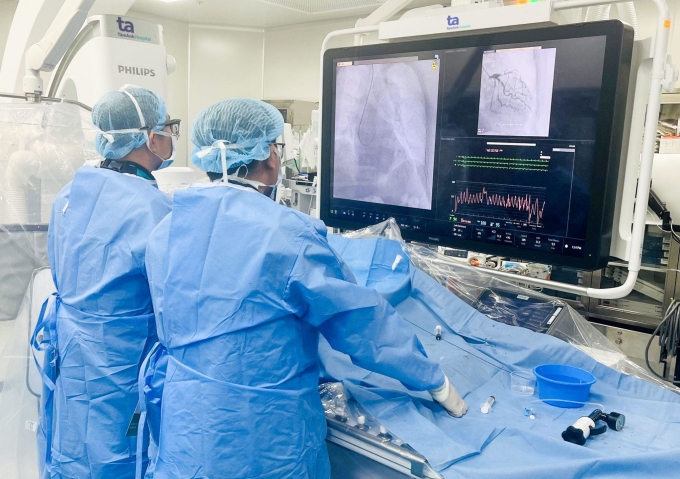
Doctor Minh (left) and his team performed coronary angiography and placed a stent for the patient. Photo: Tam Anh Hospital
Coronary angiography and placement of two stents to recanalize two left coronary arteries with 95-99% stenosis under the guidance of roadmap software and intravascular ultrasound (IVUS) for the patient using only 50 ml of contrast agent. The intervention was successful after 60 minutes.
After the stent was placed, Mrs. Tien no longer had chest pain or difficulty breathing, and her blood pressure and heart rate were normal. Thanks to the catheter being inserted through the radial artery in her wrist instead of the femoral artery, she was able to walk and do normal activities and was discharged from the hospital after two days.
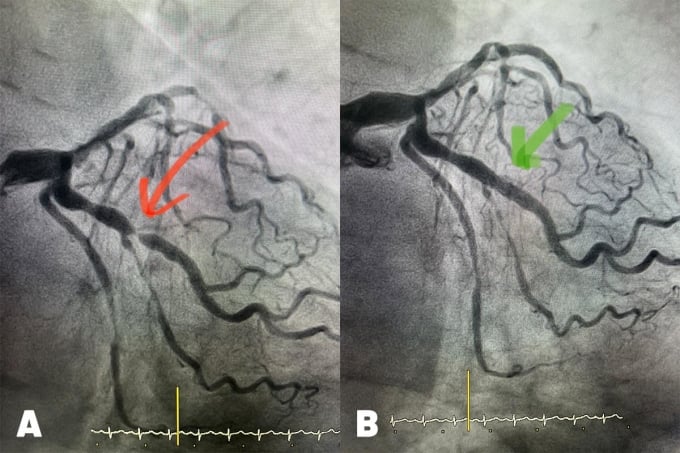
The patient's anterior interventricular artery was 99% stenotic (Figure A) and after stent placement (Figure B). Photo: Tam Anh Hospital
Along with medical treatment to prevent anaphylactic shock and kidney failure, Cardiac Swing technique in coronary angiography and intervention with the support of roadmap software, intravascular ultrasound opens up opportunities to treat coronary artery disease for patients with allergies, risk of anaphylactic shock, and risk of kidney failure with contrast agents, according to Dr. Minh.
Thu Ha
* Patient name has been changed
| Readers ask questions about cardiovascular disease here for doctors to answer |
Source link













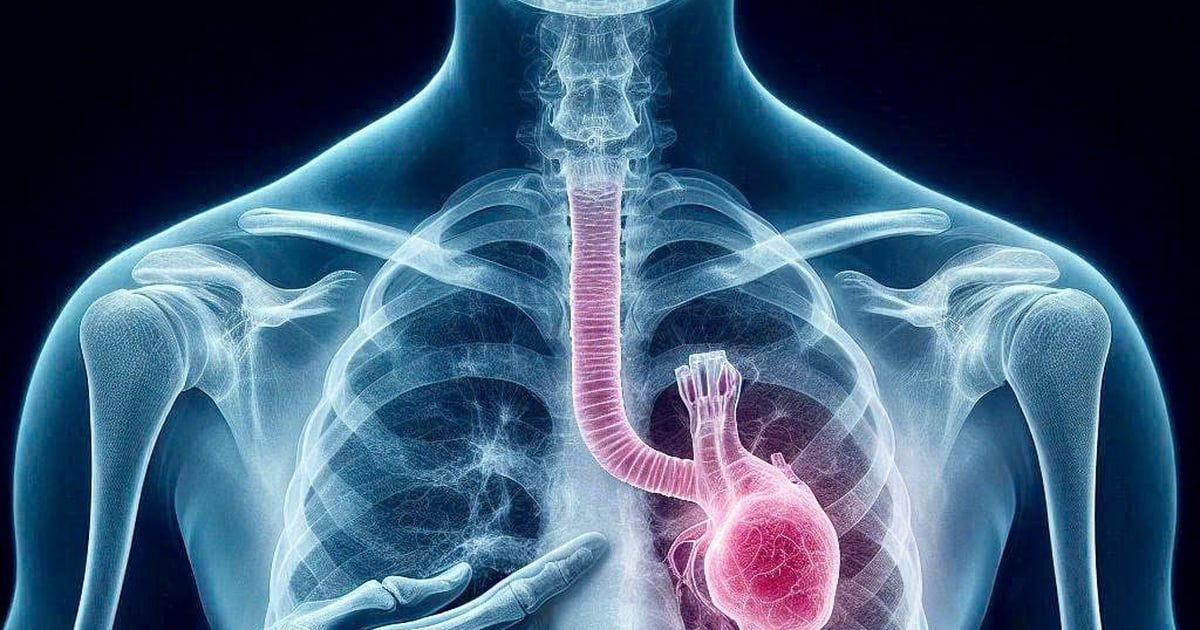

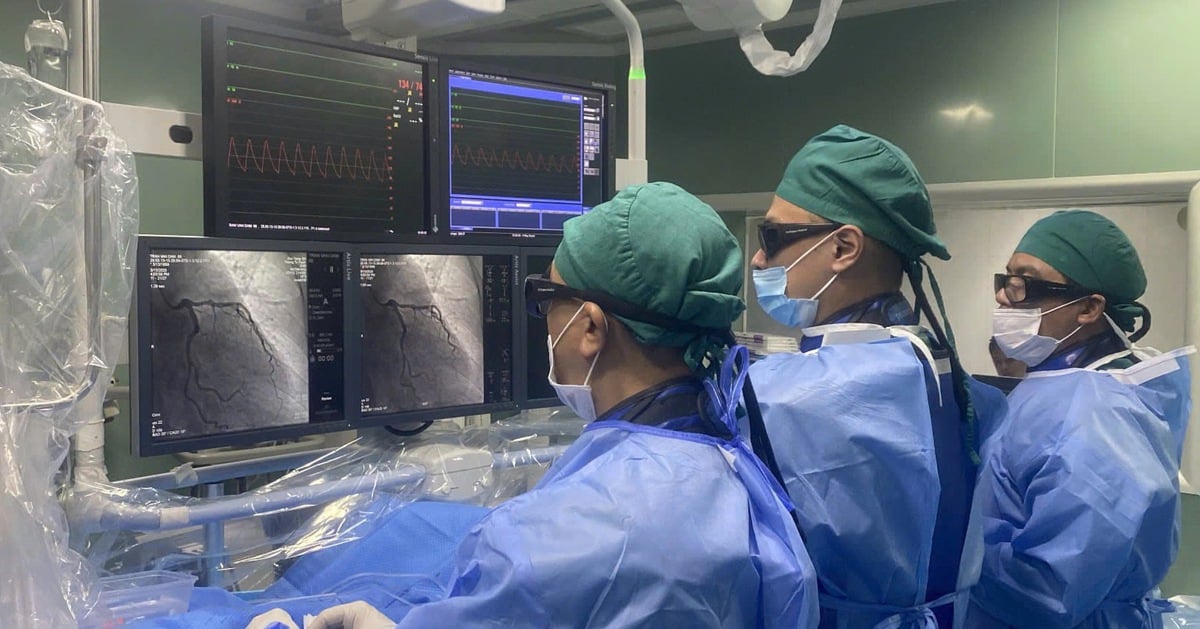




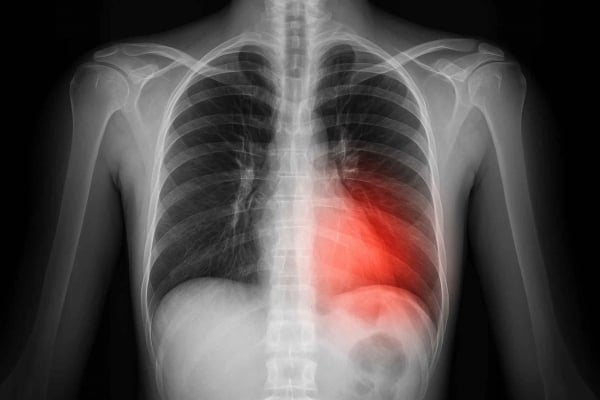












![[Photo] "Beauties" participate in the parade rehearsal at Bien Hoa airport](https://vstatic.vietnam.vn/vietnam/resource/IMAGE/2025/4/11/155502af3384431e918de0e2e585d13a)






























































Comment (0)